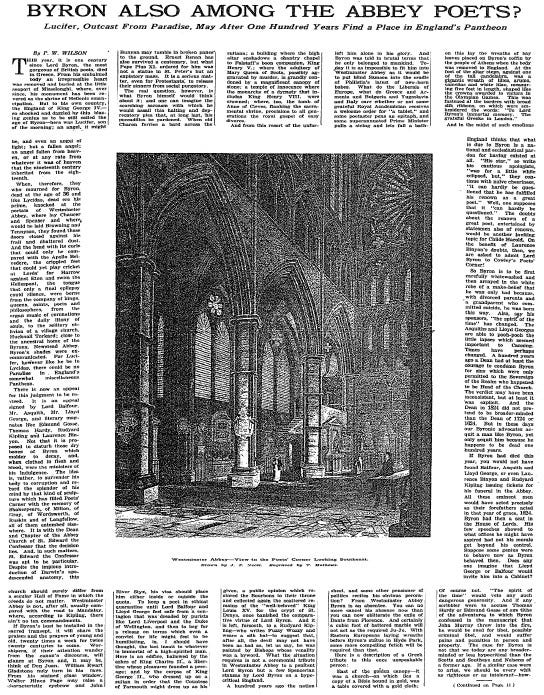Byron Also Among the Abbey Poets?
On the 100th anniversary of British poet Lord Byron's death in 1924, New York Times Magazine asked why Byron wasn't commemorated in Poets' Corner of London's Westminster Abbey. A memorial would later be erected there in 1969.
The journalist P.W. Wilson wrote that Byron's scandalous personal reputation had prevented such an honor:
When, therefore, they who mourned for Byron, dead at the age of 36 and like Lycidas, dead ere his prime, knocked at the portals of Westminster Abbey, where lay Chaucer and Spenser and where would be laid Browning and Tennyson, they found those doors closed against his frail and shuttered dust.
Many wanted a monument to Byron placed there after all, under the "better late than never" logic:
Not that it is proposed to disturb those dry bones of Byron which molder to decay, and, when clothed in flesh and blood, were the ministers of his indulgence. The idea is, rather, to surrender his body to corruption and record the splendor of his mind by that kind of sculpture which has filled Poets' Corner with the memory of Shakespeare, of Milton, of Gray, of Wordsworth, of Ruskin and of Longfellow, all of them entombed elsewhere.
Sure enough, a monument to Byron was ultimately erected in 1969. His actual body remains buried in his family vault in Nottinghamshire, though.
Other prominent poets and authors memorialized since then, even long after their death, include:
Alice in Wonderland author Lewis Carroll: died 1898, memorialized 1982
Playwright Oscar Wilde: died 1900, memorialized 1995
The Chronicles of Narnia author C.S. Lewis: died 1963, memorialized 2013
Byron Also Among the Abbey Poets?: Lucifer, Outcast From Paradise, May After One Hundred Years Find a Place in England's Pantheon
Published: Sunday, July 27, 1924


